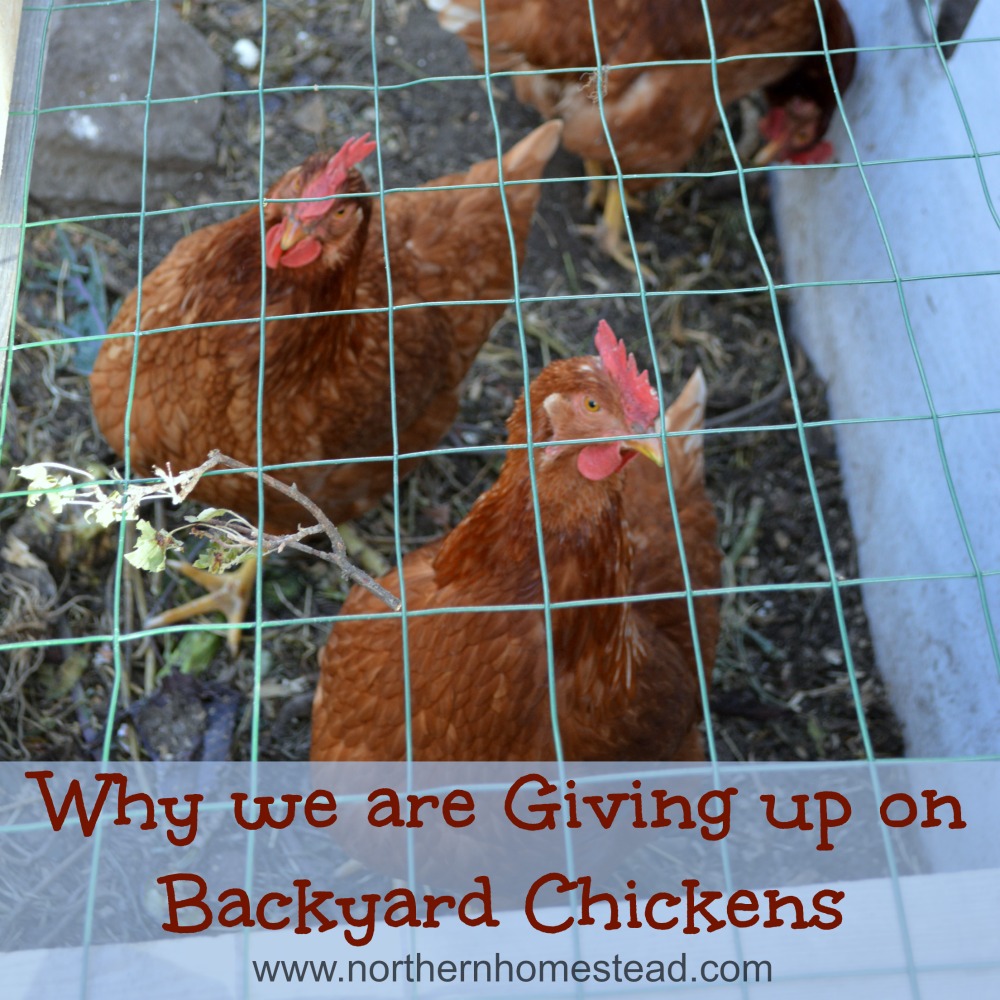
Some time ago we were visiting some friends at their farm. After a good meal, we enjoyed the evening together. The big window at the table overlooked the farmyard, and at dusk we watched the proud rooster leading his hens from the big shelterbelt to the barn for the night. Our friend, the farmer, said: “This is how it’s supposed to be”.
I had to think of our own backyard chickens. Since we are in town, they do not have a rooster. It sure is not a problem for laying eggs, but the ladies always have to figure out who leads on their own, and at times that involves a lot of fighting.
Our chickens also do not have a yard to cross or a barn to enter. Again, they are quite safe in their coop, and according to the norm have more than enough space.
Even though I enjoyed the sight of really happy chickens, it didn’t occupy my mind for too long.
Happy Backyard Chickens

Fall came and after the garden was done we let our hens roam freely in our back yard. Boy were they ever happy! It was a joy to watch them run and even fly distances to show their excitement. They scratched and looked for any bug or greenery they could possibly find. Days seemed to be too short to enjoy all the freedom.
Then winter came. To protect the hens from freezing we had to enclose them back into their chicken coop. Often when I go through the back door, I hear their begging sound to let them out again or at least bring them a treat. However, with 2 feet of snow, letting them out would not be a good idea.
As winter dragged on, I started to think more and more about the chicken situation in our backyard. I would watch them and wonder.
We lost another one of the hens due to infection. It seems to be a pattern, that one or two have to go each year.
Due to frozen ground in the coop, there is not much to scratch. They do have a warm place to escape the frost, but again, it is small and not comparable to green grass in any way.
I came to the conclusion that our backyard chickens are not very happy chickens after all. They are well cared for but in a cage.
Hybrid Chicken Breeds
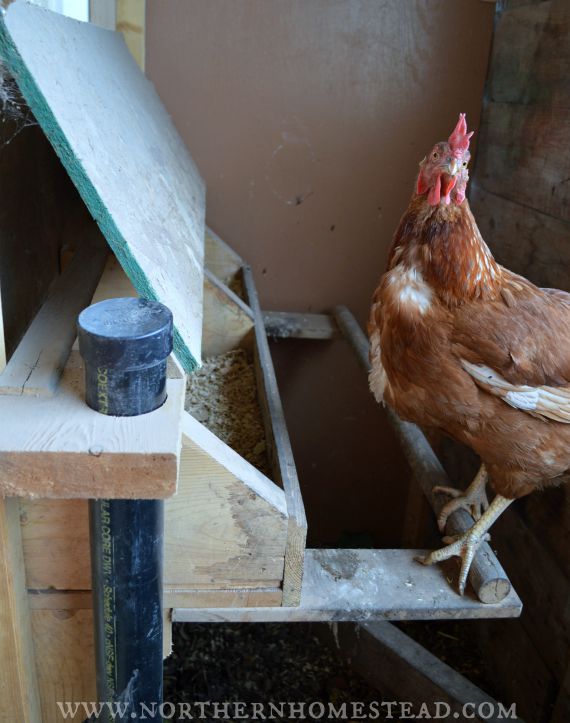
There is more to this happy chickens story. Because we have such a limited space, backyard chickens are often hybrid birds. We have the ISA brown ones. They are there to lay eggs. These chickens are often smaller than heritage chickens, and after a good year of laying an egg each day, they are worn out (read die). Just as the meat birds are bred to gain weight, and often can’t even walk.
People seem to be okay with it as long as the meat production, and in our case, the egg production is there. Thinking about it made me wonder if I’m really okay with that. Do I want a living being to suffer for my desires?
My answer is no.
Are Eggs a Good and Essential Food Source?
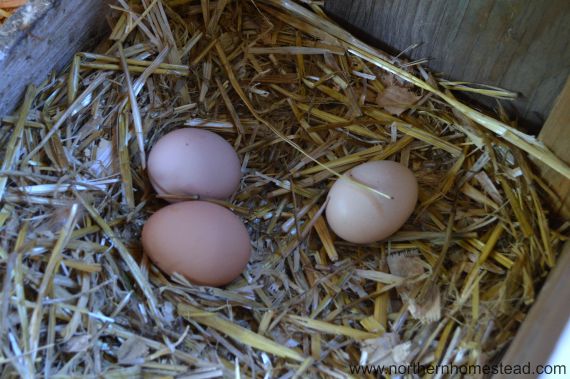
Having backyard chickens gives us a good amount of fresh eggs each day. Eggs make a quick and satisfying meal, and we can go through a lot of eggs this way. But are eggs all that good for us?
It seems to be debatable.
The advocates for eggs tell us that eggs are good for you as long as they are coming from pastured hens and we consume the yolk raw. Our backyard chickens are not pastured, and I do not care for raw yolks all that much.
The advocates against eggs tell us that eggs no matter where they come from, are neither healthy nor safe.
One can believe whomever one wants to.
But do we really need eggs? The first thing that comes to my mind when thinking of eggs is baking. To replace eggs in baking is so easy, ground flax seeds, chia seeds, or garbanzo beans flour, makes a perfect egg replacement.
Since these seeds grow in fields, it can be called a pastured egg, don’t you think?
Conclusion
Seeing that our hybrid chickens in a small coop in our backyard aren’t happy chickens, neither can the eggs of those chickens be called healthy by the healthy egg standards, and since replacing the eggs in meals is easy, we are giving up on backyard chickens.
This is a personal decision, but I wanted to share it with you because I think it is time for us homesteaders to question our actions. I know that backyard chickens do have a much better life than any hen in battery cages. Better, however, does not always mean good.
Our current hens went to a family who do have room for them to be more free. I am quite happy for them.
With the chickens gone we are now a no animal homestead. We will have to learn to make compost and worm casting, things we did not have to worry about while having the chickens. We will keep you posted!
We invite you to subscribe to Northern Homestead and follow us on Facebook, Instagram, or Pinterest for the latest updates.

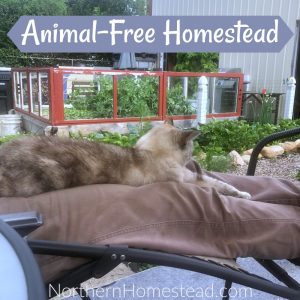
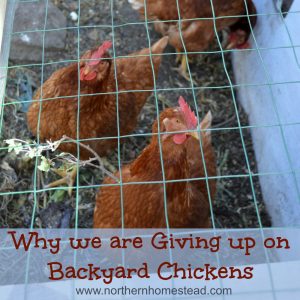
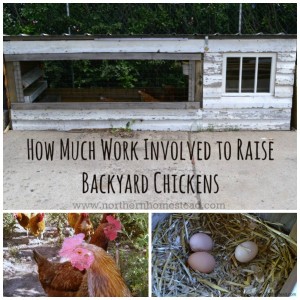
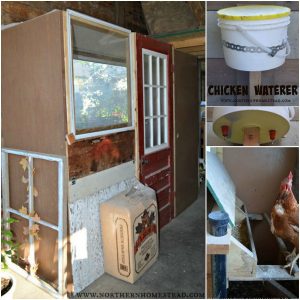
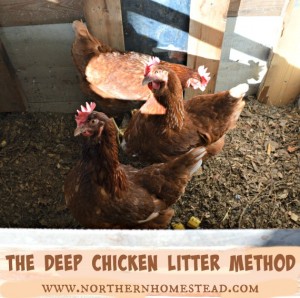
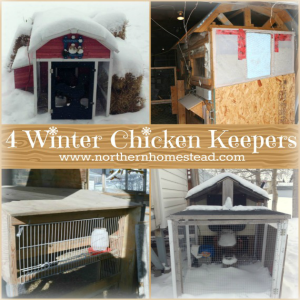
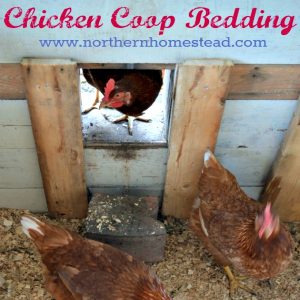


Hi! I love your blog because you’re actually in the same country as me! I get all depressed looking at green grass pictures in April. Anyway, I just wanted to let you know I support your decision to not have the chickens. I am in the same plant hardiness zone as you, at the edge of a 2b area, so it gets quite cold. -40 is not unusual. I keep a flock of mixed heritage breeds and they seem to “weather” the winter OK. Mine have a coop but no “run” – outdoors is their run, and I open the door every day, no matter what. They make a space flat with all their footsteps and it’s OK. I do usually lose one or two in the winter. But what I really wanted to say is that it is very hard to decide what to do – what fits with your life and what doesn’t. We have cattle and birds, and I’m not planning on any other animals any time soon. Pigs? Maybe. Sheep? Not as likely. But with the animals I have very little time to garden. I haven’t for 2 years now. So it’s hard to choose and I’m glad you’ve made this hard choice and shared it with all of us.
I hear you on looking at flowers and grass pictures in April. Since we do grow an indoor garden year round, it makes it a bit easier to wait. It is interesting that you say that with the animals you don’t have time to garden. Gardening is not nearly as much work as animal husbandry is.
Thanks for your post. I often debate having chickens, but I think I’ll stick to gardening for now.
We would take gardening before chickens any time. For a while we thought we could do both, but had to realize, it is not such a good idea.
Have you thought about keeping ducks? Duck eggs have many health benefits, and some folks who cannot eat chicken eggs are able to eat duck eggs. Bakers prize duck eggs for higher quality baked goods. Ducks are much more winter hardy, they live longer than chickens and produce eggs for more years. Many ducks also produce more eggs per year than chickens. Eggs are almost always laid during early morning hours and ready to collect in the morning. Ducks are not prone to the diseases that chickens face and do not require medicated feed. They do not scratch up the ground/garden, but walk over the grass. They also walk over the top of the snow. They eat lots of bugs and catch mice. They are quite a lot of fun to have around. These are many of the reasons we chose ducks.
There are a few things to consider with ducks. The hens can be quite noisy, and some neighborhoods may not allow them for this reason (drakes do not quack). Some people consider them to be much messier than chickens, but I have not had chickens so I have no comparison. I do not mind the mess. They do need to dip their heads into water daily to keep their eyes healthy. In the winter, I provide a water bowl with a heater in it to keep the water from freezing. On occasional warm winter days I provide a small pool for a few hours to splash in and clean up–it is not necessary for them to have a pool all the time. I keep a pool out for my ducks from spring-fall when it is not freezing, and it must be cleaned every few days. They all molt from mid-summer to the end of fall or early winter, and no eggs are produced during this time. (If artificial light is provided they may lay sooner.) They will eat some garden goodies and may trample on young seedlings, so are kept out of gardens during the summer months.
I have enjoyed raising ducks for the past 7 years, with few problems. I currently have 6 hens and no drakes. I have several acres for them to roam, but they rarely wander very far from their pen or the house. The ducks are locked into their house, inside their fenced pen, each night to protect them from predators. I have not had any problems keeping hens with no drakes. Their manure & bedding (wood shavings) are a great addition to my compost pile. They eat discarded greens from my garden, including those infested with aphids. Since I now have raised beds 28″ tall, they are not a problem in the garden, and actually find something to eat (bugs??) around the bases of the beds.
Our posts are so similar this week! I’m glad to hear another homesteader having these thoughts, I’ve been feeling like an oddball. 🙂
I may still keep a few hens around, but mostly for companionship and composting, and only if I can find them as rescues (there are always people in our community who try them out for a while and then decide to re-home them for one reason or another). Weather’s not as much of a concern for us here.
Thank you for sharing your thoughts, Anna!
I think it is time more of us homesteaders rethink our actions. I’m okay with being an oddball if it is for good reasons. Loved reading you post and finding out that your family comes from Alberta. Can’t blame them for leaving the cold and frost ;).
I have backyard chickens, and they have (wire tunnels) that wrap around the yard, plus a large open area where they can roam. Every 2 years I give them away and wait until the next spring to get new birds. This way I get eggs and give my birds their freedom also. I freeze eggs, to get by in the years I don’t have chickens.
Hi,
got to say it: I believe the egg is nature’s most perfect food. Yes – truly.
Research is now saying so. over the years my nutritionist friends have sited
research showing that if you don’t break the yolk (upset the lecithin) it acts as a balance for cholesterol.
now? cholesterol is being seen as very good for all parts of us – especially our cell;.and not the cause
of heart attacks. and fresh eggs are the bet.
sadly, we had guinea hens. they flew up on the roof, went into the forests, made a marvelous racket
all day long – and finally attracted the foxes. chickens this year. no -40 here – but down to 20 below.
will see.
best to all and for all our creatures,
Eliza
The problem with eggs is that in daily use how do you not break the yolk? I know some just drink it raw or add to a smoothy. Most egg users though just make scrambled eggs.
Thanks for the article. Do you think chickens might have the same issues in Buffalo NY? I have wanted to try keeping chickens but I’m not sure if the winters will be too harsh for them. Temps can go down to about 0 here (not usually into the negatives) but we do get a fair amount of snow.
We did not give up on chickens because of the cold. It is much colder here than 0. This might be helpful for you: https://northernhomestead.com/keeping-chickens-in-winter/